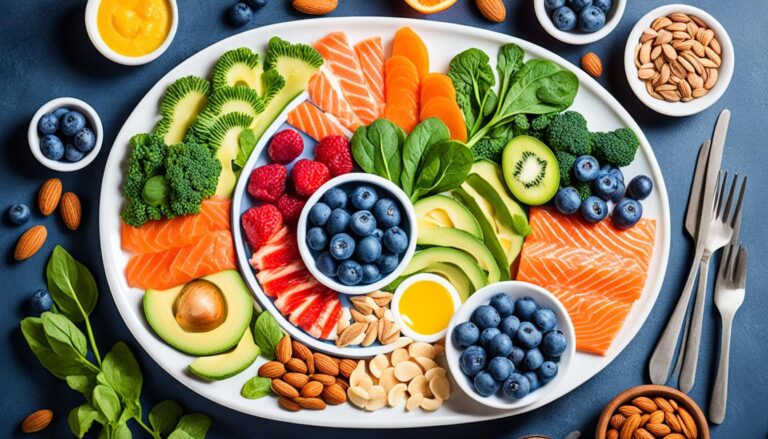Are you tired of trying to get rid of stubborn belly fat? You’re not alone. Too much belly fat can raise your risk of serious health problems like type 2 diabetes and heart disease. But, there are proven ways to lose belly fat quickly and safely.
Key Takeaways
- Excess belly fat can negatively impact your health and contribute to chronic conditions.
- Proven strategies to lose belly fat include increasing soluble fiber intake, reducing trans fats and alcohol consumption, and following a high-protein diet.
- Incorporating regular cardio and strength-training exercises, managing stress, and getting adequate sleep are also key for reducing abdominal fat.
- Limiting sugar-sweetened beverages and processed carbs can help you achieve a calorie deficit and shed belly fat.
- Consistency and patience are essential when it comes to sustainable belly fat loss.
Eat Plenty of Soluble Fiber
Adding more soluble fiber to your diet can really help with losing belly fat. Soluble fiber turns into a gel like substance when it absorbs water. This slows down how fast food moves through your body. It helps you feel full longer, absorbs fewer calories, and can reduce belly fat.
Research shows that eating more soluble fiber can lower the risk of gaining belly fat by 3.7% over 5 years. People who eat more soluble fiber are less likely to have too much belly fat. A 10-gram increase in daily soluble fiber intake can also lower the risk of belly fat.
Soluble fiber acts as an appetite suppressant, aiding in weight loss and potentially belly fat reduction.
To get more soluble fiber, eat foods like fruits, vegetables, legumes, oats, and barley. The US Department of Agriculture suggests that men should aim for 30–38 grams of fiber a day. Women should aim for 21–25 grams. Fiber supplements like psyllium husk, glucomannan, and inulin can also help, but more research is needed.
Eating more soluble fiber can help keep your gut healthy, reduce inflammation, and target belly fat. Adding more high fiber foods to your meals is a simple way to lose weight and improve your health.

Avoid Foods that Contain Trans Fats
To lose belly fat, it’s crucial to avoid foods with trans fats. These fats can cause inflammation, insulin resistance, and belly fat gain.
A 6-year study showed that monkeys on a high trans fat diet gained 33% more belly fat. This is because trans fats mess with the body’s fat-burning ways, leading to more fat around the midsection.
To cut down on trans fat-related belly fat gain, read food labels carefully. Avoid products with partially hydrogenated oils or trans fats. These are common in processed foods, fried snacks, and baked goods.
Trans fats have been linked to inflammation, heart disease, insulin resistance, and abdominal fat gain in observational and animal studies.
By removing trans fats from your diet and choosing healthier fats, you support your body’s fat-burning. This can help reduce belly fat gain.

Moderate Your Alcohol Intake
Drinking too much alcohol can lead to belly fat. Studies show that those who drink daily but in small amounts have less belly fat. This is compared to those who drink more but less often.
The Dietary Guidelines for Americans suggest drinking no more than two drinks a day for men and one for women. Following these guidelines can lower your risk of belly fat and related health issues. These include type 2 diabetes, heart disease, and metabolic syndrome.
Reducing alcohol intake can help you lose belly fat. A study found that those who drank daily but in moderation had less belly fat. This was compared to those who drank more but less often.
The link between alcohol and belly fat is complex. It can be affected by gender, genetics, and diet and lifestyle. If you’re having trouble losing belly fat, talk to a healthcare professional or a registered dietitian. They can help you moderate your alcohol and create a healthy weight loss plan.
Excess weight associated with a beer belly may increase the risk of type 2 diabetes, heart disease, and joint problems.
Lowering your alcohol consumption is key to losing belly fat. But, it’s also important to focus on your diet and lifestyle. Eating a balanced, high-protein diet and staying active can help. So can managing stress. These steps support a healthier daily intake and help you reach your weight loss goals as suggested by the Dietary Guidelines.
Eat a High Protein Diet
Protein is key when you want to lose belly fat. Foods like fish, lean meat, and beans are great. They make your body burn more calories to digest them. Plus, they help you feel full longer.
Studies show a high-protein diet boosts your metabolism and helps keep muscle while losing weight. One study found eating 30% of calories as protein led to 11 pounds lost in 12 weeks. Aim for 25 to 35% of your calories to come from protein for best results.
To get the most from a high-protein diet, eat a variety of lean proteins. This includes:
- Fish and seafood
- Lean poultry e.g., chicken and turkey
- Eggs
- Legumes e.g., beans, lentils, chickpeas
- Dairy products e.g., Greek yogurt, kefir
- Plant-based proteins e.g., tofu, tempeh, nuts, seeds
Also, add fiber-rich veggies, whole grains, and healthy fats. This makes your diet balanced and supports your weight loss goals.

Increasing protein intake to 30% of calories in overweight individuals resulted in an average weight loss of 11 pounds over 12 weeks.
| Food | Protein Content |
|---|---|
| Egg (1 large) | 7 g |
| Kefir (1 cup) | 10 g |
| Greek Yogurt (1 cup) | 20 g |
| Chickpeas (1/2 cup) | 7 g |
| Peanuts (1/4 cup) | 9 g |
| Chicken Breast (3.5 oz, cooked) | 31 g |
Moreprotein intakein your diet helps yourmetabolic rate,muscle retention, andhunger hormoneregulation. These are key for losing belly fat.
Reduce Your Stress Levels
Stress can make your belly fat worse. When stressed, your body makes more cortisol. This hormone can make you hungrier and store fat around your belly. A 2018 study found that high cortisol levels are linked to more belly fat.
Having too much belly fat is not just about looks. It can also lead to serious health problems. These include asthma, cancer, heart disease, and even dementia, as Harvard Health warns. To fight belly fat and its health risks, managing stress is key.
- Try stress-relieving activities like meditation, yoga, or deep breathing. Studies show these can help lower stress and anxiety.
- Make sure to sleep well, aiming for 7 to 9 hours each night. Sleeping too little or too much can lead to belly fat.
- Drink less alcohol, as too much can add to belly fat.
- Exercise regularly, like 30 minutes of moderate activity daily. It helps manage stress and keeps you healthy.
- Eat a balanced diet with stress-fighting foods. Include B vitamins, dark greens, avocados, bananas, fish, and chicken.
By reducing stress and adopting healthy habits, you can control cortisol and fight belly fat.

Stress is a silent killer, and it can wreak havoc on your waistline. By taking proactive steps to manage your stress levels, you can take control of your health and your body.
Don’t Eat a Lot of Sugary Foods
Too much sugar can lead to weight gain. Cutting down on candy and processed foods is key. Studies link high sugar intake to more abdominal fat.
Sugar comes in many forms, including natural ones like honey. But, even natural sugars should be eaten with care. Fructose, found in many foods, is linked to heart disease and diabetes.
- Limit your intake of candy, baked goods, and other processed foods high in sugar.
- Opt for whole, unprocessed foods and limit your consumption of fructose-containing sweeteners.
- Be mindful of your sugar intake from all sources, including natural sweeteners like honey and maple syrup.
A 2023 study in BMC Public Health suggests that sitting 8 hours or more a day was associated with higher BMI.
By cutting down on sugar and eating a balanced diet, you can lose abdominal fat. This improves your health a lot.

Do Aerobic Exercise (Cardio)
Regular aerobic exercise, or cardio, boosts your health and burns calories well. It’s shown to help reduce belly fat and improve body composition.
But, the exercise intensity matters. Some say moderate exercise is better for fat burning. Others believe high-intensity interval training HIIT works best for belly fat loss.
How often and long you exercise also counts. A study found that postmenopausal women who did aerobic exercise for 300 minutes a week lost more fat. This included fat from their belly, compared to those exercising for 150 minutes.
Studies show that aerobic exercises for belly fat help to reduce belly fat and liver fat.
To get the most out of aerobic exercise for belly fat loss, aim for 150 minutes of moderate activity weekly. You can do brisk walking, jogging, cycling, or swimming.
Remember, aerobic exercise works best with a healthy diet and lifestyle. This includes managing stress and sleeping well.
How Do I Lose Belly Fat Quickly?
Lowering your carb intake can help you lose fat, especially belly fat. A low carb diet can lead to significant belly fat loss for those who are overweight or at risk of type 2 diabetes. It’s also good for people with polycystic ovary syndrome PCOS . Switching to whole grain foods instead of refined carbs can also boost your metabolic health and cut down on belly fat.
Changing your diet isn’t the only way to lose weight. Strength training is also effective for weight loss and can target belly fat. When you do it with regular aerobic exercise, it’s even more effective. High-intensity interval training HIIT and strength building exercises are great for reducing fat around your midsection.
| Tip | Benefit |
|---|---|
| Reduce refined carbs and increase whole grains | Improves metabolic health and reduces belly fat |
| Engage in strength training | Helps build muscle and target abdominal fat |
| Combine strength training with aerobic exercise | Maximizes fat-burning potential |
Remember, losing weight and fat takes time and consistency. Aim for slow, steady progress. A balanced approach of dietary changes, exercise, and stress management is key. With patience and dedication, you can reach your belly fat loss goals.
Reducing your carb intake can be very beneficial for losing fat, including abdominal fat.
Limit Sugar-Sweetened Beverages
Shedding belly fat starts with cutting down on sugar-sweetened drinks. These include soda, punch, sweet tea, and alcohol mixers with sugar. They’re packed with fructose, which can lead to belly fat.
A study showed that drinking at least one sugar-sweetened beverage a week can increase belly fat. This is compared to those who drink less than one a week. Also, our brains don’t handle liquid calories the same as solid ones. This means we might end up consuming more calories and storing them as fat.
| Statistic | Value |
|---|---|
| Added sugars should make up less than 10% of your daily calories. | – |
| Diets high in added sugar are linked to belly fat. | – |
| Individuals who consumed sugary drinks daily had a 10% increase in visceral fat over a six-year period compared to those who did not consume sugary drinks. | – |
To lose belly fat and stay healthy, cut down on sugar-sweetened beverages, fructose, and liquid calories. Choose water, herbal teas, or fruit-infused water instead.
Get Plenty of Restful Sleep
Sleep is key for your health, including managing weight. Lack of sleep messes with hunger hormones, making you hungrier. It also raises cortisol, the stress hormone, linked to more belly fat.
Getting enough sleep is vital for a healthy life. A 2023 study found that restful sleep boosts metabolism and hormone balance. It also lowers stress, helping with weight management.
The Benefits of Adequate Sleep
- Supports healthy weight management by regulating appetite hormones
- Helps reduce stress and lower cortisol levels, which can lead to less abdominal fat
- Improves overall metabolic function and energy levels
- Enhances cognitive performance and mood
- Supports immune function and overall health
Americans sleep less now than they did decades ago. This rise in obesity is linked to less sleep. Aim for 7-9 hours of quality sleep each night to help with weight loss and overall health.
Proper sleep is essential for weight management, as it helps regulate hormones that control appetite and metabolism.Dr. Sarah Johnson, Sleep Specialist
By focusing on restful sleep, you support your body in managing weight and stress. Good sleep habits improve your overall health and help you reach your weight loss goals.
Conclusion
To lose belly fat quickly and effectively, there are several key strategies. Start by making lifestyle changes. Add more soluble fiber to your diet and avoid trans fats.
Also, drink alcohol in moderation and eat a high-protein diet. Reduce stress and limit sugar. Regular aerobic exercise and strength training are also important.
Getting enough quality sleep is crucial too. By combining these strategies, you can lose belly fat and improve your health. These changes help you shed unwanted fat and build muscle.
Remember, losing belly fat takes time and effort. Slow and steady progress is better than quick fixes. By following these proven strategies, you can achieve a healthier, fitter body.





